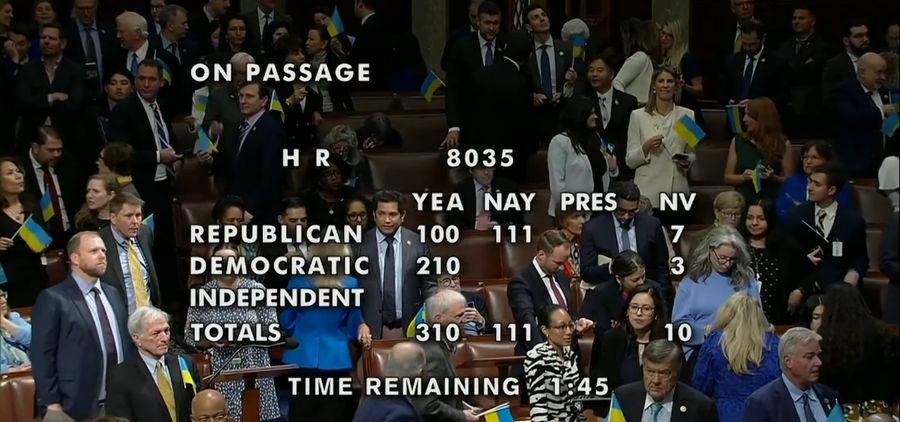With the United States’ Congress having voted on the bill concerning foreign aid, Ukraine can finally look forward to crucial aid coming in over the next few days and weeks. In doing so, the United States is finally coming through on supporting Ukraine in its time of need.
US Congress paves the way for the confiscation of frozen Russian assets
In general, the long-awaited aid package will provide military aid to Ukraine and Israel, replenish US weapons systems and give humanitarian assistance to civilians in Gaza. The package totals $95.3 billion in spending, which matches the total that the Senate passed in mid-February.
But there are also a few differences with the Senate bill designed to win over some House conservatives.

Funds for weapons, US operations in Europe, and oversight
As noted by AP News, the aid to support Ukraine totals about $60.84 billion. Republicans on the House Appropriations Committee said that more than a third of that amount would be dedicated to replenishing weapons and ammunition systems for the US military.
It is fair to say that more than a third of these funds ($23.2 billion) will actually remain in the United States, as they will be spent on replenishing the US weapons and supplies that have been transferred to Ukraine.
The rest of the funds provided by the bill will be distributed as follows:
- $13.8 billion will be used to purchase advanced weapons systems, defense products, and defense services for Ukraine;
- $11.3 billion will be spent on ongoing US military operations in Europe;
- another $26 million will be used to continue oversight and accountability of the assistance provided to Ukraine.
Among the weapons that could go very quickly are the critical 155 mm rounds and other artillery, along with some air defense munitions. The official spoke on the condition of anonymity to discuss preparations not yet made public.
Another interesting point in the bill is the US president’s commitment to immediately transfer long-range ATACMS missiles to Ukraine. But Biden has a loophole in this matter. According to the text of the document, the president may refuse to transfer ATACMS if the transfer would harm US national interests.
A host of sites across Germany, Poland, and other European allies are also helping Ukraine maintain and train on systems sent to the front.
For example, Germany set up a maintenance hub for Kyiv’s Leopard 2 tank fleet in Poland, near the Ukrainian border. The nearby maintenance hubs hasten the turnaround time to get needed repairs done on the Western systems.
“Forgivable loan” for economic assistance to Ukraine
This is not all the money that Ukraine will receive under the initiative.
The bill also provides for direct financial assistance to the Ukrainian budget for $7.85 billion. But there is a caveat – it will be a loan. The main difference between the two packages is that the House bill provides more than $9 billion in economic assistance to Ukraine in the form of “forgivable loans.” The Senate bill included no such provision seeking repayment.
In his other bill, on US national security issues, Johnson provided for the adoption of the so-called REPO law, which allows the US president to transfer seized Russian assets to Ukraine.
As explained by Ukraine’s Ambassador to the United States Oksana Markarova, the document stipulates that no later than 90 days after its adoption, the US president must submit a report to Congress listing every individual and legal entity subject to EU and British sanctions. The bill is expected to allow Ukraine to receive up to $8 billion in Russian assets seized in the United States.
Weapons moving “within days”
Because the United States have an expanded network of storage sites both in the US as well as in Europe that already hold the ammunition and air defense components that Kyiv needs, the Pentagon could get weapons moving to Ukraine within days. With the Pentagon press secretary noting that they would like to ”rush” the security assistance as soon as possible.
Pentagon press secretary Maj. Gen. Pat Ryder said: “We would like very much to be able to rush the security assistance in the volumes we think they need to be able to be successful.”
Furthermore, the Pentagon has had supplies ready to go for months but hasn’t moved them because it is out of money. It has already spent all of the funding Congress had previously provided to support Ukraine, sending more than $44 billion worth of weapons, maintenance, training, and spare parts since Russia’s full-scale invasion in February 2022.
With Congress passing the bill, President Joe Biden, a Democrat, has said he will sign it “immediately,” which then triggers the Pentagon to begin pulling stockpiled weapons to deliver to Ukraine.
“The House must pass the package this week, and the Senate should quickly follow,” Biden said. “I will sign this into law immediately to send a message to the world: We stand with our friends, and we won’t let Iran or Russia succeed.”
When an aid package for Ukraine is announced, the weapons are either provided through presidential drawdown authority, which allows the military to immediately pull from its stockpiles, or through security assistance, which funds longer-term contracts with the defense industry to obtain the systems.
The presidential drawdown authority, or PDA, as it’s known, has allowed the military to send billions of dollars worth of ammunition, air defense missile launchers, tanks, vehicles and other equipment to Ukraine.
“In the past, we’ve seen weapons transferred via presidential drawdown authority arrive within a matter of days,” said Brad Bowman, director at the Foundation for the Defense of Democracies center on military and political power.
President could cancel loan; requirement for strategy on Ukraine war
The US president would be authorized to set the terms of the loan to Ukraine and also be given the power to cancel it. Congress could override the cancellation but would have to generate enough votes to override a veto, a high bar considering how the two chambers are so evenly divided.
Johnson, as he seeks GOP support for the package, noted that former President Donald Trump has endorsed a “loan concept.”
He also noted that the House package includes a requirement for the Biden administration to provide a plan and a strategy to Congress for what it seeks to achieve in Ukraine. The plan would be required within 45 days of the bill being signed into law. House Republicans frequently complain that they have yet to see a strategy from Biden for winning the war.
The bill said the report from the administration must be a multiyear plan that spells out “specific and achievable objectives.” It also asked for an estimate of the resources required to achieve the US objectives and a description of the national security implications if the objectives are not met.
Read more:
- CIA Director warns Ukraine can lose war in 2024 without US aid
- US House Speaker Johnson moving forward with Ukraine aid bill despite GOP hardliner opposition
- ”No US aid, no choice but retreat,” Zelenskyy warns
- Syrskyi: Situation on multiple frontline directions significantly deteriorated
- Mike Johnson rejects senate bill on Ukraine aid
- Politico: Biden’s team quietly collaborates with House Speaker Mike Johnson to secure Ukraine aid
- Zelenskyy tells EU Russia has almost entirely destroyed Ukraine’s thermal power capacity, asks for air defense help






